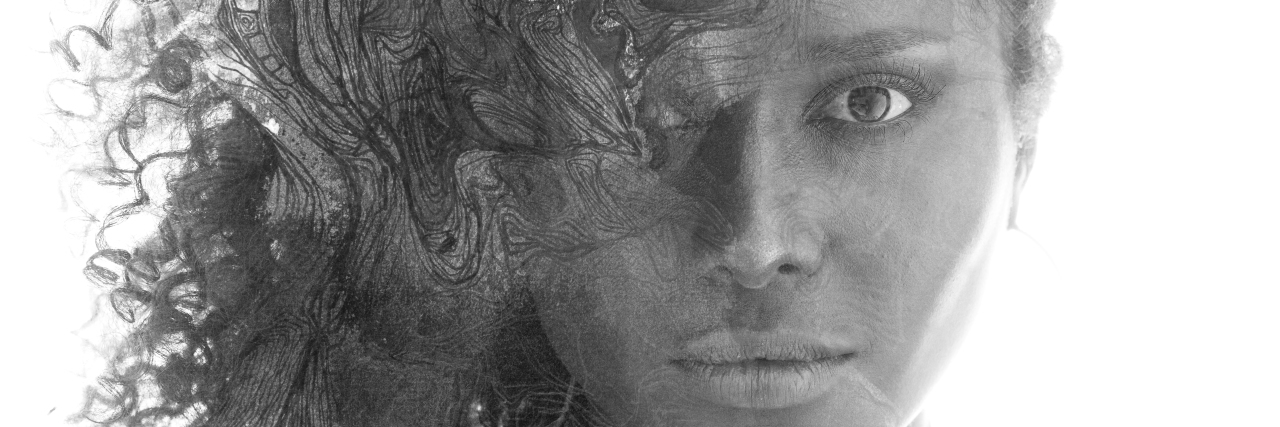“It’s stress – your body is trying to tell you that you are you stressed.” The gaping bald spots at my temples and crown revealed themselves faster than I could register that something was not right. I looked at myself in the mirror – grief staring back at me. “I’m OK…we’re OK…” I looked down and cradled my body as if this long overdue nurturing could convince my scalp to stop attacking itself.
The damage was done. Quite honestly, we had been here before, repeatedly. I didn’t arrive at this state of being after a few months of severely stressful situations; when I reflect back over my life and medical history, my doctor’s notes are riddled with the same phrases, “stressed,” “feeling anxious,” “experiencing acid reflux.” In my teens I asked my doctor to put me on birth control to regulate my menstrual cycle after too many times of my period showing up whenever it felt like it. I didn’t understand it then the way that I do now, but at the time, my doctor connected my irregular cycle with stress – beginning at age 15. At twice that age, it finally clicked. I had a 52-day cycle and that was not normal.
In high school and college, my irregular cycle meant that I ruined clothes more often than other women. At 30, my irregular cycle signaled that my personal life journey included carrying about 30 pounds of unexplained weight gain and a physiological roadblock to the destination of motherhood. The realization that I had been manifesting the same physical symptoms for over a decade left me devastated.
How could my health and life been different if someone had taken time to help me identify and manage stressors more constructively in my teens?
All of the exercise and self-care practices in the world may do nothing more than put a dent in my load of cumulative stress at this point.
Living with chronic stress looks like a quickened heartbeat when an unexpected email from my supervisor flashes across my screen.
It’s a burning sensation flaring up in my chest as I chat with a family member with whom I have a difficult relationship.
It looks like a twitch of my right eye as I rush to my next meeting.
On the rare occurrence that I make it through the day without experiencing some combination of these, I am left in shock and awe.
Like many Black women and women of color in America, any number of persistent stressors could be drivers of my symptoms. Daily, I navigate the emotional and psychological labor of serving as the only Black woman on my team, living with unhealed trauma, and working to maintain boundaries with toxic family members, in cyclical fashion.
As I have aged, the symptoms have diversified to include tension headaches, insomnia and unexplained stomachaches. I have normalized feeling chronic stress in my body to such a degree that I fail to recognize it until my body has no choice but to take drastic physiological measures to force my mind to acknowledge what my body already knows. We have felt this for far too long and we cannot continue on this way.
My personal experience and a plethora of medical research have demonstrated that stress can negatively impact all systems of the body including muscles, respiratory, cardiovascular, endocrine, gastrointestinal, nervous and reproductive systems.
When the central nervous system (CNS) fails to return to normal or if the stressor does not go away, the body’s stress response continues. Research suggests that persistent stressors can produce persistent changes to psychological and physiological structures and processes. The way that I perceive, interpret and respond to myself and others could reflect disruption to the physiological systems that facilitate my body’s response to stress.
Seeking more effective ways to manage my stress and minimize my physical reactions to stressors, I have incorporated practices such as meditation, journaling and breathwork. However, I recognize that genetics and certain life experiences are factors that contribute to my reactions to stressful situations. Overactive or underactive stress responses may stem from slight differences in the genes that control stress responses; additionally, strong stress reactions sometimes can be traced to traumatic events such as neglect during childhood.
Having employed commonly described methods to cope with stress, I recognize that I require a more comprehensive approach – a stress management plan. Practicing a higher degree of self-awareness will equip me to employ management practices as early as possible to achieve relief and reverse the stress response, providing my body with an opportunity to recover and allowing my mind to approach challenges from a proactive perspective rather than a reactive one.
If I want to do more than cope with stress, I need to change the way I interpret and respond to stressful experiences. While that may take more time and certainly more information than I have today, knowing that living with chronic stress could be more than working against succumbing to the physical and physiological symptoms I currently experience offers some semblance of hope. I am not sure what life could be like on the other side of this work, but I look forward to knowing what it feels like to experience less stress and stress symptoms.
Have you experienced chronic stress growing up? How has that affected you? Let us know in the comments below.

